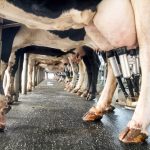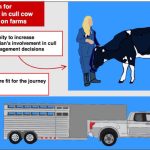Dairy

Canola meal shows benefits for milk production, lower emissions
New study reviewed 20 years of nutrition research

Taking the bite out of cold-weather livestock care
Strategies for keeping calves warm and healthy

Colostrum has value for sick calves
Colostrum testing and feeding frequency has risen on Canadian dairy farms

Cull cow protocol usage could be improved
Survey finds 62 per cent of Ontario dairy farmers have written cull cow procedures

Lactanet to publish sexed semen fertility ratings
Farmers will now have access to information previously only sent to bull line-up owners

Many factors affect milk frothing problem
Lactation length, milking frequency, prechilling and filter replacement all contribute to higher free fatty acids

Taking the human out of dairy cow classification
Canadian start-up eyes artificial intelligence-based dairy cow evaluation

Lactanet embarks on LPI modernization process
Predictive production index has become cumbersome, complicated

Cows managed precisely in new robot milking barn
Cows can be sorted in five different directions out of the robot

Methane breeding tool’s developers look to long-term adoption
Uptake has been slow among producers, but the discussion on methane efficiency has begun
